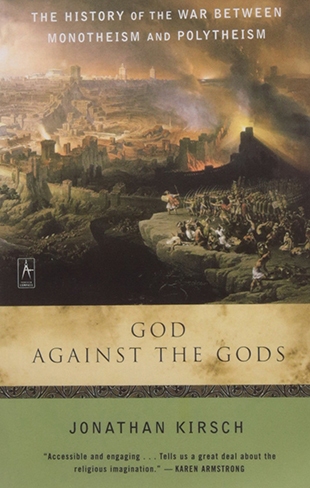Jonathan Kirsch is the author of Moses: A Life and King David: The Real Life of the Man Who Ruled Israel. He writes book reviews for the Los Angeles Times and lectures widely on biblical, literary, and legal topics. In this hard-hitting book, he takes a long and sustained look at the roots of religious hatred and intolerance in the three monotheistic religions of Judaism, Christianity, and Islam.
Prior to these faiths, polytheism flourished in many different cultures. Kirsch observes: "At the heart of polytheism is an open-minded and easygoing approach to religious belief and practice, a willingness to entertain the idea that there are many gods and many ways to worship them. At the heart of monotheism, by contrast, is the sure conviction that only a single god exists, a tendency to regard one's own rituals and practices as the only proper way to worship the one true god. The conflict between these two fundamental values is what I call the war of God against the gods — it is a war that has been fought with heart-shaking cruelty over the last thirty centuries, and it is a war still being fought today." The author's survey of this pernicious war covers the reign of Akhenaton, the Egyptian pharaoh who was the world's first recorded monotheist; King Josiah as a reinventor of the faith of ancient Israel; the battle between the pagans and Christians in Ancient Rome; the efforts of Constantine to make Christianity the one religion; the war within the Christian church over the divinity of Christ; and the pagan counter-revolution of Julian, the Roman emperor.
One of the most interesting dimensions of Kirsch's work is his defense of paganism, which he does not see as the "abomination" most biblical writers call it. Religious propaganda paints this rich array of beliefs and practices as "a parade of horribles" and by that is usually meant idolatry, sorcery, human sacrifice, and power given to women. In the first century C.E., people living in large cities could choose to honor the gods and goddesses of the Greco-Roman pantheon or serve the imported deities of Isis or other mystery cults. Today, angry Christians write off a variety of contemporary off-shoots of paganism, but Kirsch reminds us that the values which many Americans cherish, such as diversity and religious liberty, are pagan values.
Finally, Kirsch notes that although fanatics have tarnished monotheism with violence and hatred, these traditions still contain deep resources of forgiveness, compassion, love, and service which can serve as antidotes to extremism. Hopefully, these values will prevail throughout the rest of this century and give monotheism a good name.
